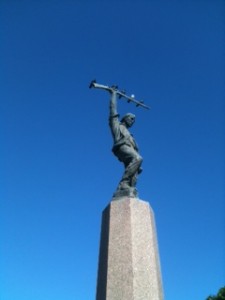 This monument stands in a charming little park in San Antonio. It shows Old Ben Milam asking who will follow him into Bexar (San Antonio). The row of pigeons resting on his rifle struck me as funny, but I reasoned it was better to be for the birds than go to the dogs.
This monument stands in a charming little park in San Antonio. It shows Old Ben Milam asking who will follow him into Bexar (San Antonio). The row of pigeons resting on his rifle struck me as funny, but I reasoned it was better to be for the birds than go to the dogs.
Being Texan is a fulltime job. At work or play, we are Texans. When traveling abroad, if asked where we hail from, the answer is always, “Texas!” Not America or the U.S., but Texas. Only the most remote Amazon natives would fail to recognize the name, and even they might get it, given a few additional hints like, “Dallas! The Alamo! Willie Nelson!”
Texans aren’t just born; we’re made. We teach Texas history in elementary and middle school. Prospective teachers have to pass a course in Texas history to get certified. We won’t let you near our kids if you don’t Remember the Alamo.
Texas history classes also serve to educate those seeking naturalized Texan citizenship. In the 19th century, Texas was the destination for thousands of settlers who wanted do-overs on the American Dream. My own mother was born in Tennessee. She travelled via the great Tennessee-Texas Turnpike, a little-known piece of infrastructure used whenever that state was tilted, causing about half its population to roll downhill into Texas. This explains why most Texans know that “holler” doesn’t only mean “to yell,” a fact unknown in New Mexico or Arizona.
Many of our early Texas heroes were known for glorious, lopsided battles in which they were killed. Later on they were known for glorious, lopsided battles in which they did the killing–of bandits, rustlers, Native Americans, and shepherds. Still later, they became famous for glorious, lopsided mineral rights deals, which brought millions of dollars to the oil companies and gave the landowners a fine down payment on a new chicken.
Like Willie, my heroes have always been cowboys. It’s hard to view them in their natural habitat, the working ranch, but if you avoid the interstates and take smaller state roads, you will see them in the towns. You don’t have to hang out in ranch stores where they sell exotics like squeeze chutes and calving chains. All you have to do is drop in at the local café VERY early in the morning. About 6:00 a.m. they meander in, take their usual chair at their usual table, and greet their look-alike friends with a nod and as few words as possible. The waitress doesn’t ask for their orders; she just brings their coffee, hot and strong, and keeps the refills coming.
Their lives are etched on their faces. Eyes crinkle at well-worn stories, while they stir their coffee to cool it down. After a while, displaying true telepathy, they shift their eyes from one to another, unfold themselves from their chairs, and leave, a ritual repeated in a hundred little cafes every day.
No Texan questions teaching our kids Texas history. Crockett, Houston, Travis, et al are prologue to history still being made. It’s not being made in Dallas or Houston but in little cafes in tiny towns that dot the state. The people in those towns remember the Alamo, the Dustbowl, when local oil fields played out, and the years they found a way to feed their livestock when it would have been smarter to shoot them. Texas history isn’t for the birds. It’s for Texans.
Janet,
Your bonafides are showing. But can you sing “Texas, Our Texas”?
I can sing most of it and hum the rest.